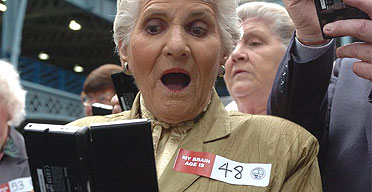
According to her TV advert, after playing Brain Training on the Nintendo DS, Nicole Kidman, 39, has a brain age to match her strangely smooth-skinned face age: 24. The game on the handheld console, which includes memory and reaction time tests, was developed by the Japanese neuroscientist Ryuta Kawashima and has sold 10m copies worldwide, spawning a craze for "brain training" that the New York Times estimated was worth more than £40m in the US alone last year.
Newspapers print brain-training puzzles, you can get games on your mobile phone and computer, and there are a number of books. Though they make vague claims to boost brainpower, they are not regulated or subject to clinical trials.
So do they work? "There is no evidence these tests do anything to improve cognition," says Jason Braithwaite, a cognitive and neuro-psychologist at the University of Birmingham. "They are no more worthwhile than playing chess or doing a sudoku puzzle or crossword. It won't turn you into a superbrain." Braithwaite says that the idea that you can reduce your brain's age is "ridiculous. With these tests, you are improving your practice at very specific things [such as short-term memory or reaction times], but that doesn't necessarily mean it gives you a general cognitive benefit."
However, according to a new American study, computer-based brain training can improve IQ beyond becoming better at practised tasks. Half of the 70 volunteers were trained in tests that measured memory and reaction time. When tested on unrelated problems, those who had been trained performed better than those who hadn't. Encouraging research, but some critics have said that the number of volunteers tested is too small to be conclusive.
"There needs to be a large clinical trial on brain training," says Clive Ballard, director of research for the Alzheimer's society. "These games are being marketed widely, but people could be wasting time and it raises false hope." It is likely that many older people buy these gadgets in the hope it will stave off Alzheimer's. Ballard says: "There is much better evidence to say that if you were going to spend 30 minutes a day doing something [to reduce the risk], you'd be better off doing physical exercise than brain training."

